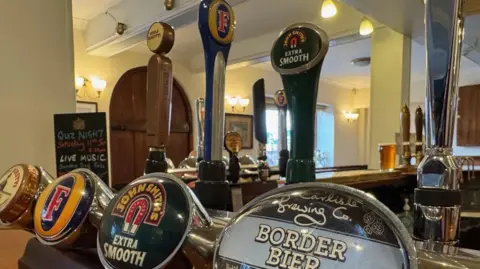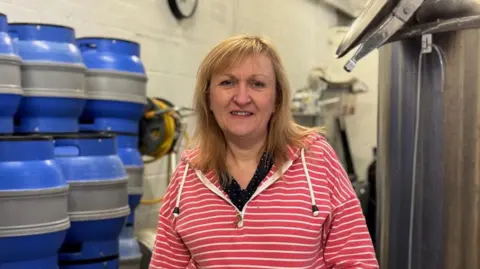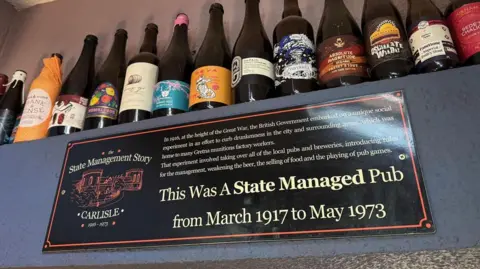Independent brewers want more access to pubs
 BBC
BBCAlison Davis started a real ale brewery in Cumbria in 2013 along with her husband, Alain.
Since then, the Carlisle Brewing Company has had to overcome everything from Covid-19 to cost-of-living problems to survive in an industry that has been struggling.
So every sale counts, but small brewers face one seemingly insurmountable barrier to their ambitions.
Almost a third of the UK's pubs are owned by chains of companies who control which beers their landlords stock - often big brands rather than products from independent local breweries.
Alison says that, frustratingly, local landlords in what are known as "tied pubs" are effectively barred from doing business with her.
"We are still at the point where our ability to grow is hindered by not being able to get our beer into these pubs," she said.
"I think around 29% of pubs nationally are owned by these companies, so it's a fair chunk of the market that cannot be accessed by small local breweries."

This is a long-standing concern of the association that represents local breweries, the Society of Independent Brewers and Associates (Siba).
It has been pressing for changes to the regulations, that chains should be compelled to offer their publicans the opportunity to offer at least one draught guest ale from a small independent local brewery.
And they have an ally in Alison's MP, Carlisle's Julie Minns.
The Labour politician is particularly keen on change because of her constituency's unique history.
'Disproportionate number'
The city's pubs were nationalised during World War One because of concerns about drunkenness among the 30,000 workers employed to make munitions in a factory just a few miles over the border in Scotland.
Under the State Management Scheme, everything from opening hours to the strength of the beer served was controlled by civil servants.
It was a system that only ended in 1973 and, when the premises were finally privatised, they were largely sold off to a few chains of companies.
Minns said: "In most places you would have a reasonable number of what are called free houses that can choose where their beer comes from.
"That sell-off has left Carlisle still with a disproportionate number of tied pubs and so it's more difficult for small local breweries."

And there will soon be some more evidence of what difference it could make - after a similar campaign north of the border; this year the Scottish government is introducing changes that will include a right for tied pub landlords to stock a local independent ale.
To ensure the big brewers do not muscle in, only up to 5,000 hectolitres, or about 875,000 pints, of the guest ale can have been brewed in the previous year.
With the UK government about to begin a consultation in its own review of the Pubs Code in England and Wales, Minns sees it as a perfect opportunity for the same change to happen south of the border.
She said: "When the Scottish code comes into practice, a landlord just 700m away from my constituency will be able to enter into agreements with local independent brewers, while on my side of the border the pubs won't have that freedom.
"So I would love to see the government put the same provision into the existing English pubs code as part of the consultation."
The government has said it will be looking at what happens in Scotland, but will "need a bit of time to understand how it works".
Alison says she and her fellow brewers recognise opening up another slice of the market will not solve all the industry's problems.
However, she believes it it will give the Carlisle Brewing Company, and others who have battled on, a better chance of survival.
The British Beer and Pub association has been approached for comment.
See more on this story on BBC Politics North.
Follow BBC Cumbria on X, Facebook, Nextdoor and Instagram. Send your story ideas to [email protected].
